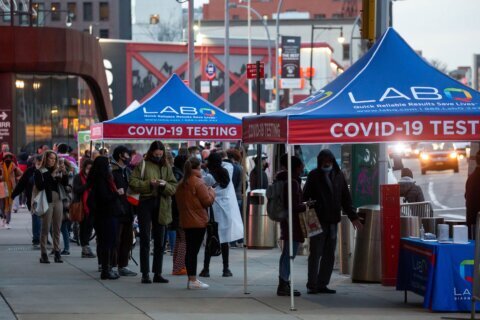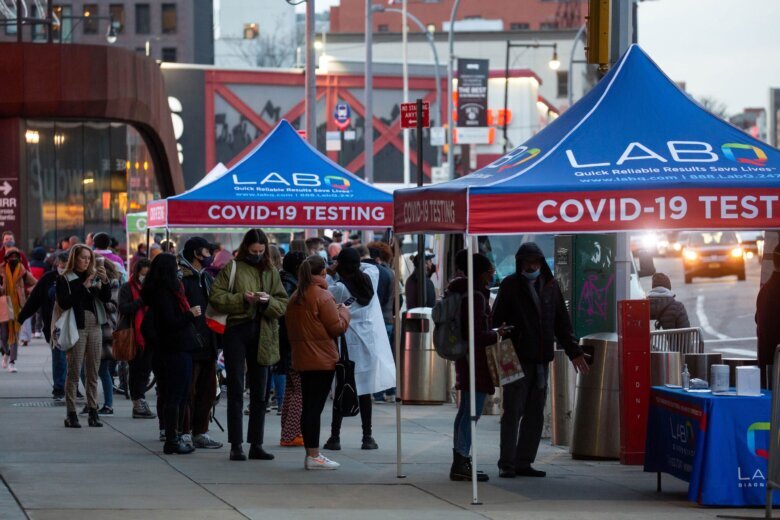
With the Delta and Omicron coronavirus variants spreading across the nation as the new year approaches, health experts are urging Americans to get vaccinated or boosted to protect themselves and others before they face greater chances of infection.
Airport travel before Christmas is up by nearly double from a year ago, according to Transportation Security Administration data, with more than two million people screened each day from December 16-18. And the indoor gatherings among friends and family that highlight the holiday season could ultimately infect more who are at higher risk for Covid-19 complications.
“We’re all anticipating with Delta, with all the travel that we’re doing and all these holiday get-togethers, the beginnings of Omicron and its spread as well as … influenza also making its appearance, we could be in for an ominous winter season and a kind of grim beginning of the new year,” Dr. William Schaffner, a professor in the Division of Infectious Diseases at the Vanderbilt University School of Medicine, told CNN’s Jim Acosta Sunday.
Covid-19 hospitalizations trended upward over the past month as medical facilities in some parts of the country have been inundated with patients infected with the Delta variant. Now, the presence of Omicron — which scientists believe to be more contagious though most cases so far appear to be mild — may push some strained health care systems to the brink.
“It is quite likely that we are going to see in some sections of the country, a significant stress on the hospital system as well as on the health care workers who are getting exhausted by all of this,” NIAID director Dr. Anthony Fauci told ABC’s “This Week” Sunday, noting that a more transmissible form of Covid-19, such as Omicron, will have a greater impact on the tens of millions of Americans who have not been vaccinated.
Fauci has said traveling and gathering for Christmas and New Year’s can be done safely among those who are inoculated, and getting booster shots into the arms of vaccinated Americans remains paramount to increase antibody response.
“If we’re going to deal with Omicron successfully, vaccinated people need to get boosted,” Fauci told NBC Sunday.
Recent data is demonstrating the potential dangers of remaining unvaccinated, including a 10-times greater risk of testing positive and 20-times greater risk of dying from Covid-19 than those vaccinated and boosted, according to US Centers for Disease Control and Prevention (CDC) data through October.
“Omicron has thrown a curveball” in the fight against Covid-19, former Food and Drug Administration commissioner Dr. Scott Gottlieb said Sunday, and everyone — especially those around unvaccinated or higher-risk individuals — needs to take precautions.
“A lot of people don’t want to be linked in a train of transmission that could get to a vulnerable person, so we should be prudent over the next four to six weeks,” he told CBS’ “Face the Nation.”
For any individual with a known exposure to Covid-19, Dr. Richina Bicette-McCain, a medical director at Baylor College of Medicine, reiterated CDC guidelines that those vaccinated and without symptoms can isolate and wait a few days before being tested. But for those not vaccinated who have yet to get tested, it is critical to find out whether they are infected before visiting others for the holidays.
“If you’ve been exposed and have not tested negative, please do not go travel and potentially expose other people,” she told CNN’s Pamela Brown Sunday.
President Joe Biden is set to meet with his Covid-19 response team Monday. He will address the nation Tuesday regarding the latest developments with Omicron and to issue another “stark warning of what the winter will look like for Americans who choose to remain unvaccinated,” the White House said.
States responding to outbreaks
Omicron has been identified in at least 45 US states as of Sunday, according to state officials in their respective states, as well as Puerto Rico and Washington, DC. And with Delta still present, cases in some areas are rising.
New York — which was among the hardest-hit states at the beginning of the pandemic — set a new record for single-day Covid-19 cases for a third consecutive day Sunday, according to Gov. Kathy Hochul’s office.
There’s generally about a three-week lag behind Covid-19 case trends and hospitalizations, according to a CNN Health analysis, but officials are hopeful the state will be in a more favorable position than last year.
“This is not March of 2020, we are not defenseless,” Hochul said. “We have the tools to protect ourselves and the vulnerable loves ones in our families: Get vaccinated, get the booster and wear a mask when indoors or in large gatherings. Don’t take a chance during the winter surge.”
New Hampshire Gov. Chris Sununu told CNN’s “State of the Union” Sunday that the state has been preparing for a winter surge and hopes to combat Covid-19 spread with measures including state-issued at-home testing and flexing beds within hospitals. Bringing in health care workers from other states has been key as well, Sununu said.
Maryland Gov. Larry Hogan predicted that the state will see “probably the worst surge we’ve seen in our hospitals throughout the entire crisis” over the next three to five weeks, telling “Fox News Sunday” that officials are “trying to do everything we can to get the last 9.2% of our population vaccinated.”
Lockdowns are not being considered, he said, and decried a return to remote learning in schools since protocols currently in place should be sufficient.
Schools and sports are making changes
The tenor of the conversation around Covid-19 may shift depending on whether hospitalizations spike or plateau in the coming weeks. Yet some universities and sports leagues are already working to curtail possible spread.
Citing the “uncertainty” around the Omicron variant, Stanford University announced it is shifting to online instruction for the first two weeks of the upcoming winter quarter, slated to begin January 3.
Harvard University is also moving to remote learning for the first three weeks of January classes, stating in an open letter that the move was “prompted by the rapid rise in Covid-19 cases locally and across the country, as well as the growing presence of the highly transmissible Omicron variant.”
A growing number of Covid-19 cases have forced postponements in several major sports leagues. Seven NHL teams have been temporarily shut down as of Sunday, and the league and its players’ union announced that games through Christmas that required cross-border travel between the US and Canada will be postponed.
Five NBA games have been postponed as several teams in the league have numerous players under Covid-19 health and safety protocols. More than a dozen games in NCAA men’s basketball have been canceled or postponed.
And the NFL delayed three of its Sunday games and updated its Covid-19 testing procedures, which will no longer call for testing of asymptomatic, fully vaccinated players, coaches and other staff with close contact to players. All individuals will be screened for Covid-19 symptoms prior to entering team facilities, according to a copy of the protocols obtained by CNN.








